Key Takeaways:
Leading ServiceNow alternatives in 2026 include Jira Service Management, Freshservice, Halo, BMC Helix ITSM, and Atomicwork, delivering 40-60% cost savings over three years with faster deployment times of 4-12 weeks.
Organizations switch from ServiceNow primarily due to cost pressure, complexity fatigue, and the desire for AI-native automation without months-long implementations or hidden renewal fees.
Jira Service Management excels for DevOps teams with native development tool integration starting at $7.53 per user monthly, while Freshservice targets growing businesses with an intuitive UI at $19 per user monthly.
Modern ITSM migration frameworks enable predictable timelines ranging from 4-6 weeks for small teams to 10-16 weeks for enterprises, with companies like Azentio completing 500-user migrations in 8 weeks while cutting costs by over $200,000 annually.
What are the top ServiceNow alternatives in 2026?
The top ServiceNow alternatives in 2026 are Jira Service Management, Freshservice, BMC Helix ITSM, Halo ITSM, Zendesk, SolarWinds Service Desk, Ivanti Neurons, Rocketlane, and Atomicwork. Platforms that deliver 40–60% cost savings, faster deployments, and AI-native automation without ServiceNow's complexity.
The global IT Service Management (ITSM) market was valued at USD 10.5 billion in 2023 and is projected to more than double to USD 22.1 billion by 2028 (CAGR ~15.9%)(MarketsandMarkets)."
Organizations are seeking platforms that boost efficiency, streamline support, and keep budgets under control. Your platform decision impacts everything: operational costs, support speed, end-user satisfaction, and how quickly you can respond to change.
In 2026, the most credible ServiceNow competitors will bring consumer-grade UX, AI-native interfaces, and transparent pricing to the table, without the months-long implementations or hidden renewal fees that have frustrated CIOs for years.
Quick Answers for Busy Leaders:
Best ServiceNow alternatives: Jira Service Management, Freshservice, BMC Helix, Halo ITSM, Zendesk, SolarWinds, Ivanti Neurons, Rocketlane, and Atomicwork.
Why switch? Lower costs, faster deployments, easier admin, generative AI, and no-code automation.
Cost comparison: Most leading alternatives are 40–60% less expensive than ServiceNow over three years (see detailed table below).
Fastest migrations: 4–12 weeks for most organizations using modern migration frameworks like saasgenie.
“When saasgenie moved Azentio from ServiceNow to Jira Service Management, we completed the migration in just 8 weeks, cutting licensing and admin overhead while delivering a more agile, integrated support environment.”
Popular for: Mid-market and enterprise IT, HR, CX, and operations teams seeking speed, simplicity, and agile support environments.Correct timestamps: Audit trails maintain their original chronology, preserving your compliance history.
IT buyers in 2026 want instant clarity on options, costs, and differentiators, no fluff, no vendor spin. Let's get right to it.
Why Organizations Are Switching from ServiceNow
Based on our work with hundreds of migrations, here are the top drivers:
Cost pressure: 40–60% lower TCO over three years.
Complexity fatigue: Modern platforms deploy in weeks, not months.
AI-first architecture: Native automation vs. bolt-on features.
Transparent pricing: No surprise renewals or hidden fees.
Developer experience: Better integration with modern DevOps tools.
Admin efficiency: Less specialized training required.
The tipping point usually comes at renewal time, when organizations realize they're paying for features they don't use or complexity they don't need.
Top ServiceNow alternatives:
At-a-glance comparison for CIOs
Atlassian Jira Service Management: Native integration with agile development, ideal for DevOps-driven IT.
“In our migration with Azentio, we completed the switch from ServiceNow to Jira Service Management, reduced their combined licensing and admin costs by over $200,000 annually, while enabling a simpler, more scalable support environment.”
Freshservice (Freshworks): User-friendly, fast setup, strong AI and automation, popular with IT and business teams.
BMC Helix ITSM: Deep enterprise automation, advanced workflow design, FedRAMP-ready.
Halo ITSM: Modern, cloud-native, highly flexible deployment options.
Zendesk: Customer service powerhouse now offering robust IT support, especially for CX-centric orgs.
SolarWinds Service Desk: Combines asset management with ITSM, well-suited for mid-market IT.
Ivanti Neurons: AI-powered automation, proactive IT ops, strong endpoint management.
Rocketlane: Blends project delivery and ITSM, ideal for teams handling onboarding or cross-functional projects.
Atomicwork: AI-first platform with workflow simplicity and consumer-grade UI.
In 2026, CIOs are comparing alternatives not just to ServiceNow but to a rapidly diversifying competitive set. Gartner now profiles 20 ITSM vendors in its market guide. (ITSM.tools, OTRS).
Quick Decision Matrix
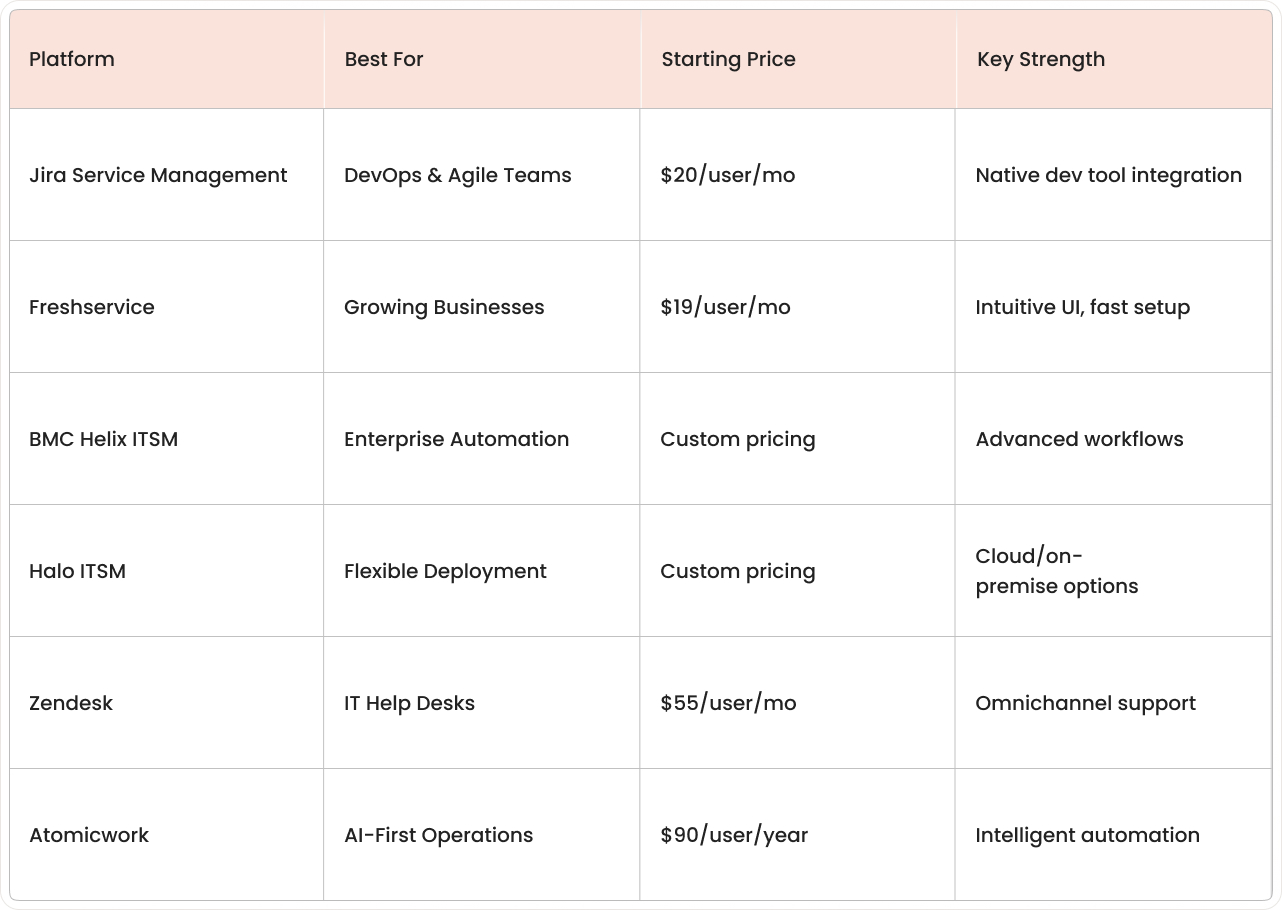
What’s next: Below, we’ll take a closer look at the top five ServiceNow alternatives, breaking down what makes each one stand out for modern IT, HR, and operations teams. Consumer search behaviors are shifting; leaders want instant clarity and actionable details. So we’re diving right into the critical differences, cost factors, and real-world strengths for CIOs making platform decisions in 2026.
Top 5 ServiceNow Alternatives for 2026
1. Freshservice: Best for Growing Businesses with a Modern UI
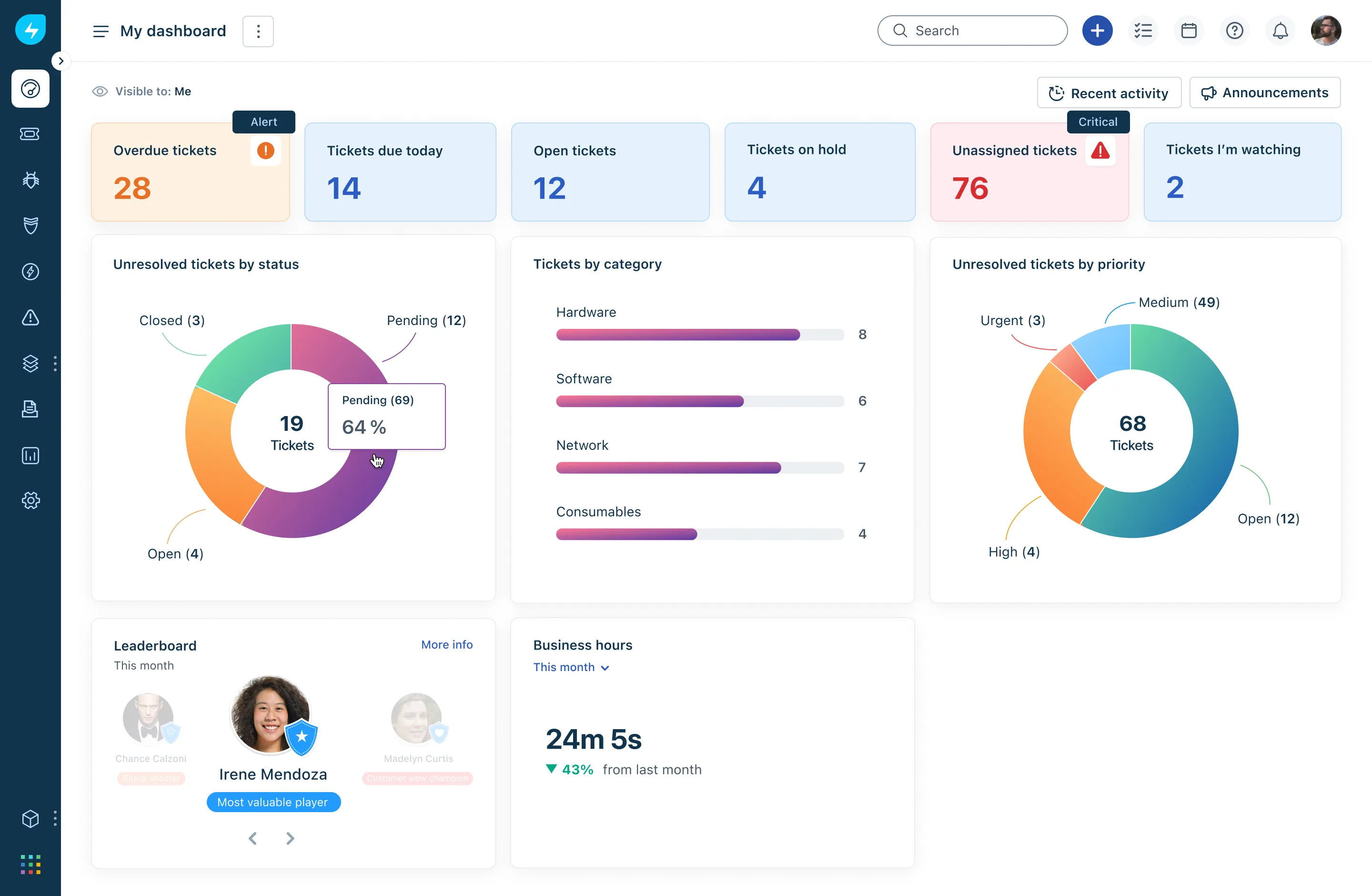
Overview
What is Freshservice? Freshservice is a cloud-native ITSM platform that combines AI-powered automation with an intuitive interface, designed specifically for growing businesses that need enterprise-grade service management without the complexity or cost of traditional tools.
Developed by Freshworks, it simplifies service delivery through self-serve options, robust integrations, and end-to-end IT management. Making it ideal for teams that want to deploy fast and scale efficiently.
Key Features of Freshservice:
✔ User-friendly dashboard: Intuitive and easy to navigate.
✔ AI-powered automation: Automatically assigns and resolves tickets.
✔ Comprehensive ITIL processes: Supports incident, problem, change, and asset management.
✔ Self-service Portal: Allows users to resolve common IT issues independently.
✔ Integrations with business apps: Connects seamlessly with Slack, Workday, DevOps tools, Microsoft 365, and Google Workspace.
Pros of Freshservice:
✔ Simple and intuitive interface: Minimal learning curve.
✔ Affordable compared to ServiceNow: Ideal for smaller teams.
✔ Good automation features: AI-driven workflows improve efficiency.
Cons of Freshservice:
❌ Advanced asset management features are still maturing. Despite Device42 integration, some features are evolving for enterprise needs.
Freshservice Pricing:
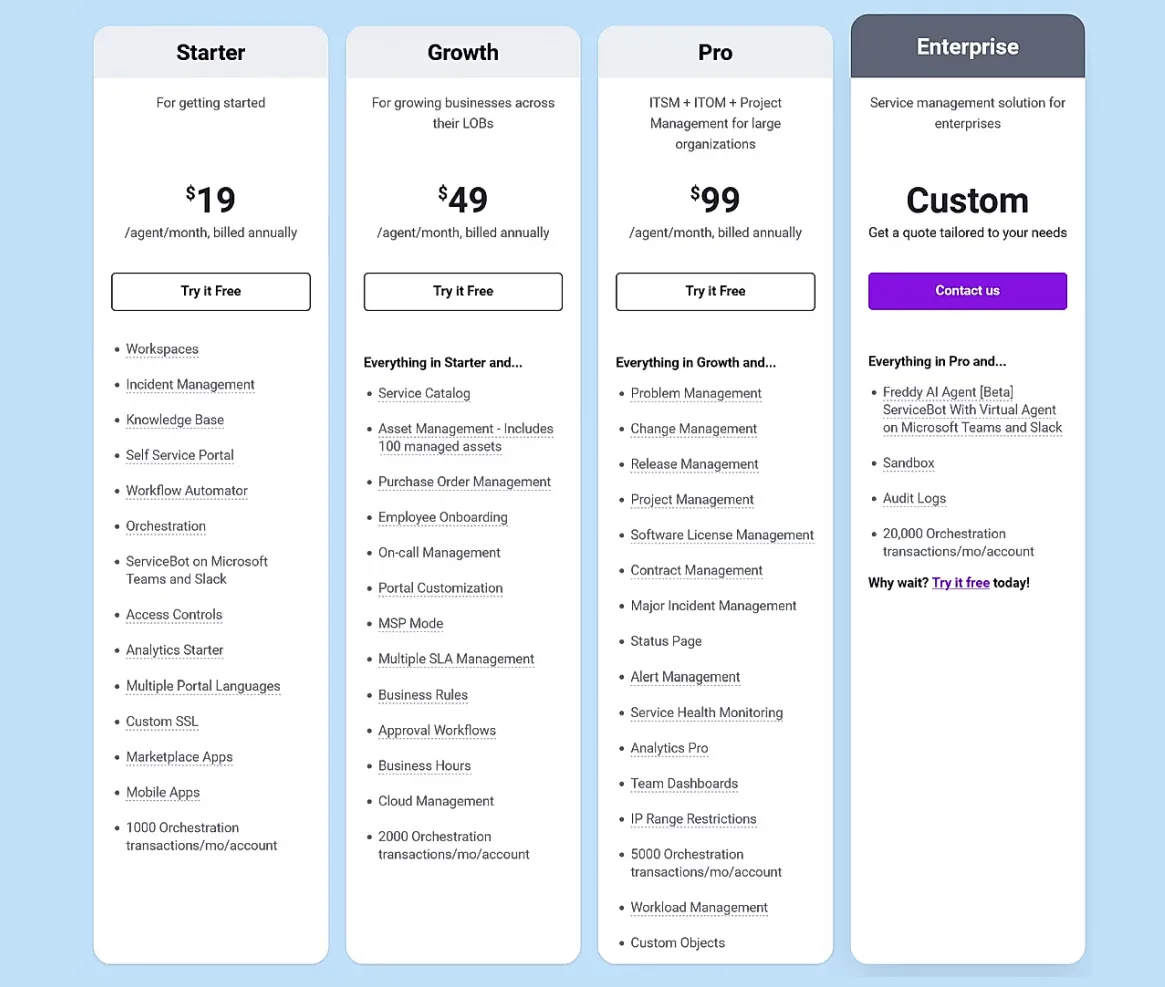
💲 Starts at $19 to $99 per user per month, with additional automation features in higher-tier plans
Freshservice is Best for
🏢 Small to enterprise-sized businesses looking for a modern ITSM tool that is easy to implement and manage.
Looking to transform your ITSM?
2. Jira Service Management: Best for DevOps and Agile Teams
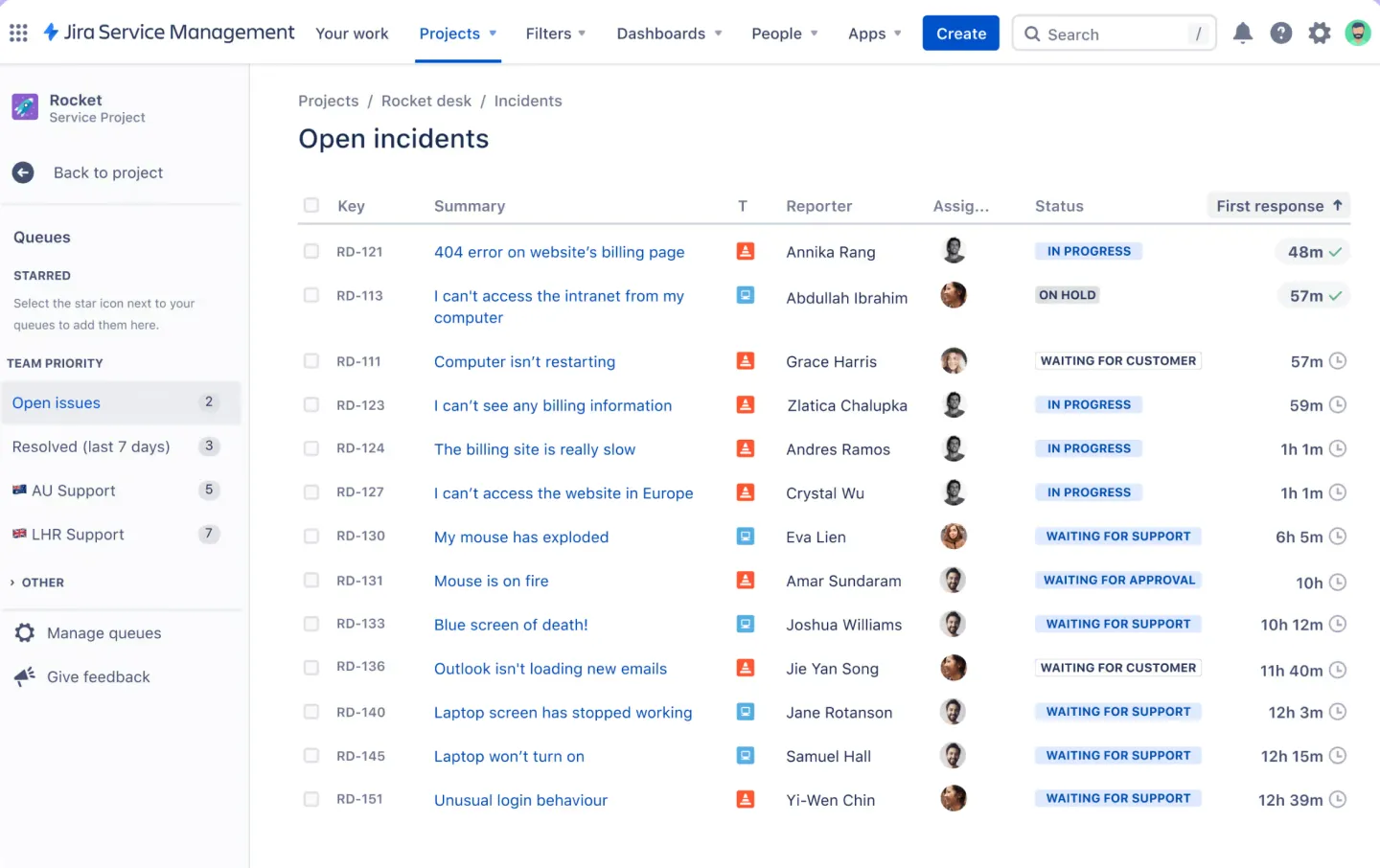
Overview
What is Jira Service Management? Jira Service Management is an ITSM platform built by Atlassian specifically for IT teams working in DevOps and agile environments, offering deep integration with development tools to streamline service management and improve collaboration between IT and software development teams.
Developed by Atlassian, it goes beyond traditional ITSM by integrating project management capabilities, enabling IT teams to track, prioritize, and execute service requests alongside development projects.
Key Features of Jira Service Management:
✔ Integration with Jira and Confluence: Ideal for teams that already use Jira.
✔ Agile-friendly workflows: Supports Kanban and Scrum boards for IT teams.
✔ Incident and change management: Helps IT teams track and resolve issues efficiently.
✔ Automation for approvals and escalations: Reduces manual workload.
✔ Third-party integrations: Works with Slack, Bitbucket, and Trello.
Pros of Jira Service Management:
✔ Great for DevOps and software teams: Seamlessly integrates with development tools.
✔ Flexible and customizable workflows: Adapts to different IT processes.
✔ Transparent pricing: Clear costs without hidden fees.
✔ API integration: Connect with third-party tools to automate workflows.
Cons of Jira Service Management:
❌ Less suited for non-technical teams. Designed with software developers in mind.
❌ Can be complex for IT teams unfamiliar with Jira’s interface.
Jira Service Management Pricing
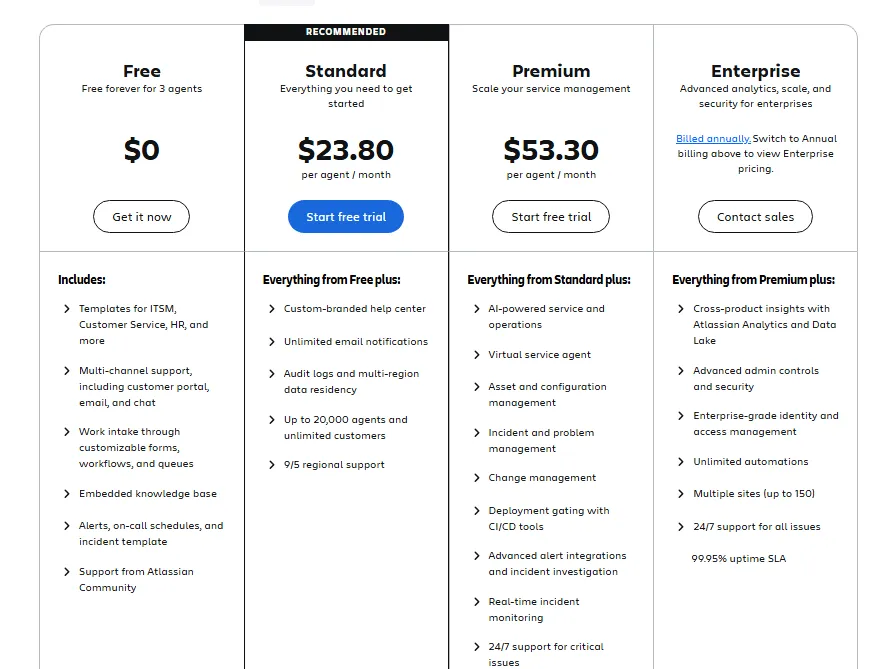
💲 Starts at a basic plan of $7.53 per user per month, with free plans available for small teams and custom ones for enterprises.
Jira Service Management is Best For
💻 IT teams, DevOps professionals, and software companies looking for an ITSM tool that integrates with development workflows.
Looking to transform your ITSM?
3. Zendesk: Best for IT Help Desks and Support Teams
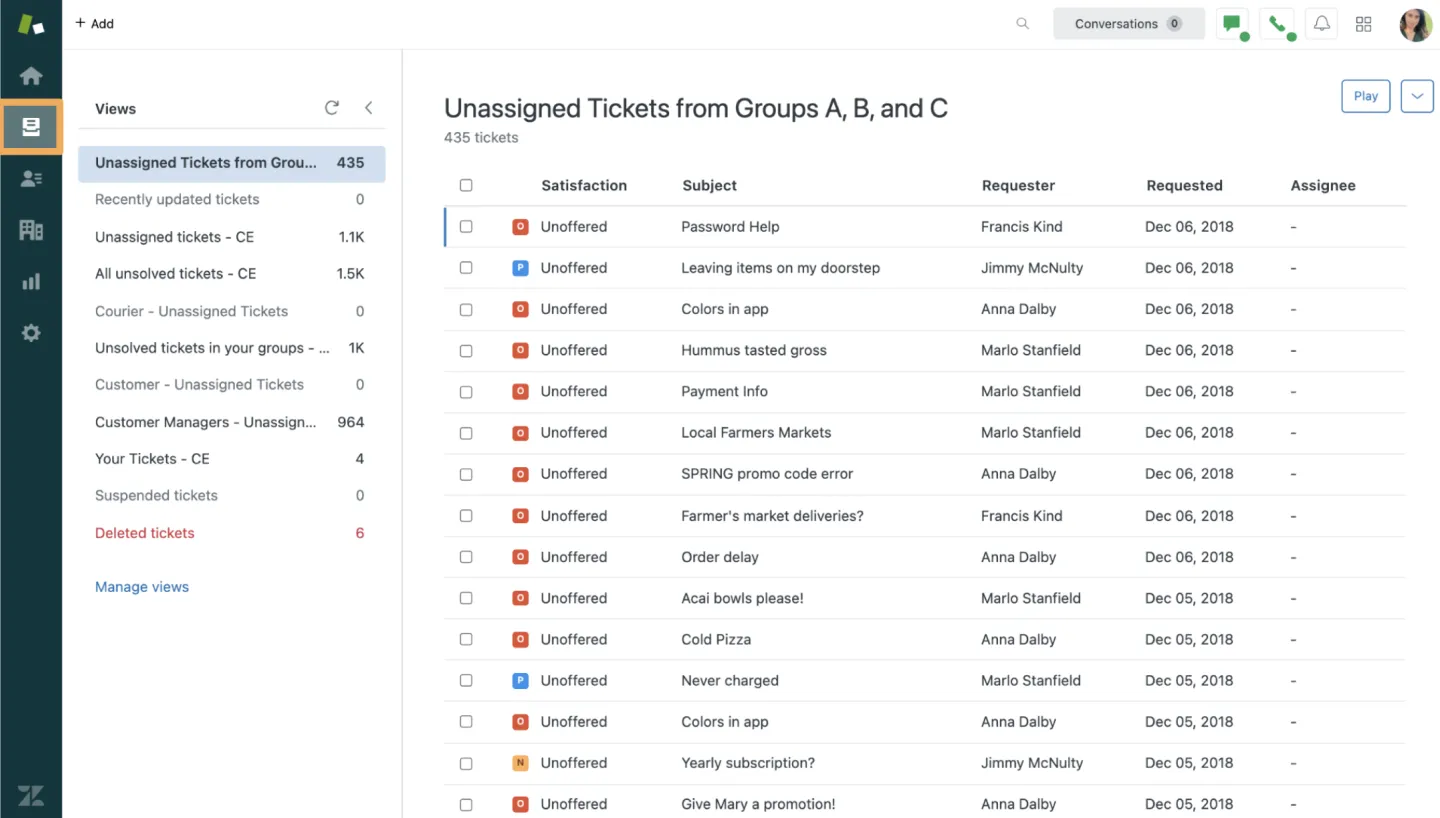
Overview
What is Zendesk? Zendesk is a customer service and IT service management platform that brings omnichannel support capabilities to IT help desks, offering an affordable and easy-to-use alternative to ServiceNow for organizations focused on support and service delivery.
Zendesk is widely known for its customer service solutions, but it also offers a strong IT service management platform. If your IT team focuses on support and service delivery, Zendesk provides an accessible solution that doesn't sacrifice functionality.
Key Features of Zendesk:
✔ AI-powered ticketing system: Smart automation for issue triage.
✔ Omnichannel support: Manage IT requests through email, chat, social media, and phone.
✔ Self-service knowledge base: Reduces IT tickets with a user-friendly help center.
✔ SLA tracking and reporting: Ensures service quality and response times.
✔ Third-party integrations: Works with Microsoft Teams, Slack, and Salesforce.
✔ Customizable form interfaces: Create tailored ticket forms to capture specific user requests.
Pros of Zendesk:
✔ Simple and intuitive interface.
✔ Good for IT support teams.
✔ Affordable compared to enterprise ITSM tools.
Cons of Zendesk:
❌ Limited ITIL features.
❌ Less customizable than other platforms.
Zendesk Pricing

💲 Starts at $55 to $115 per user per month, making it one of the most cost-effective options.
Zendesk is Best For
🎧 IT help desks, simple incident management for startups, and small businesses needing a straightforward and affordable IT service solution.
Looking to transform your ITSM?
4. HaloITSM: Best for Enterprises Requiring AI-Driven ITSM
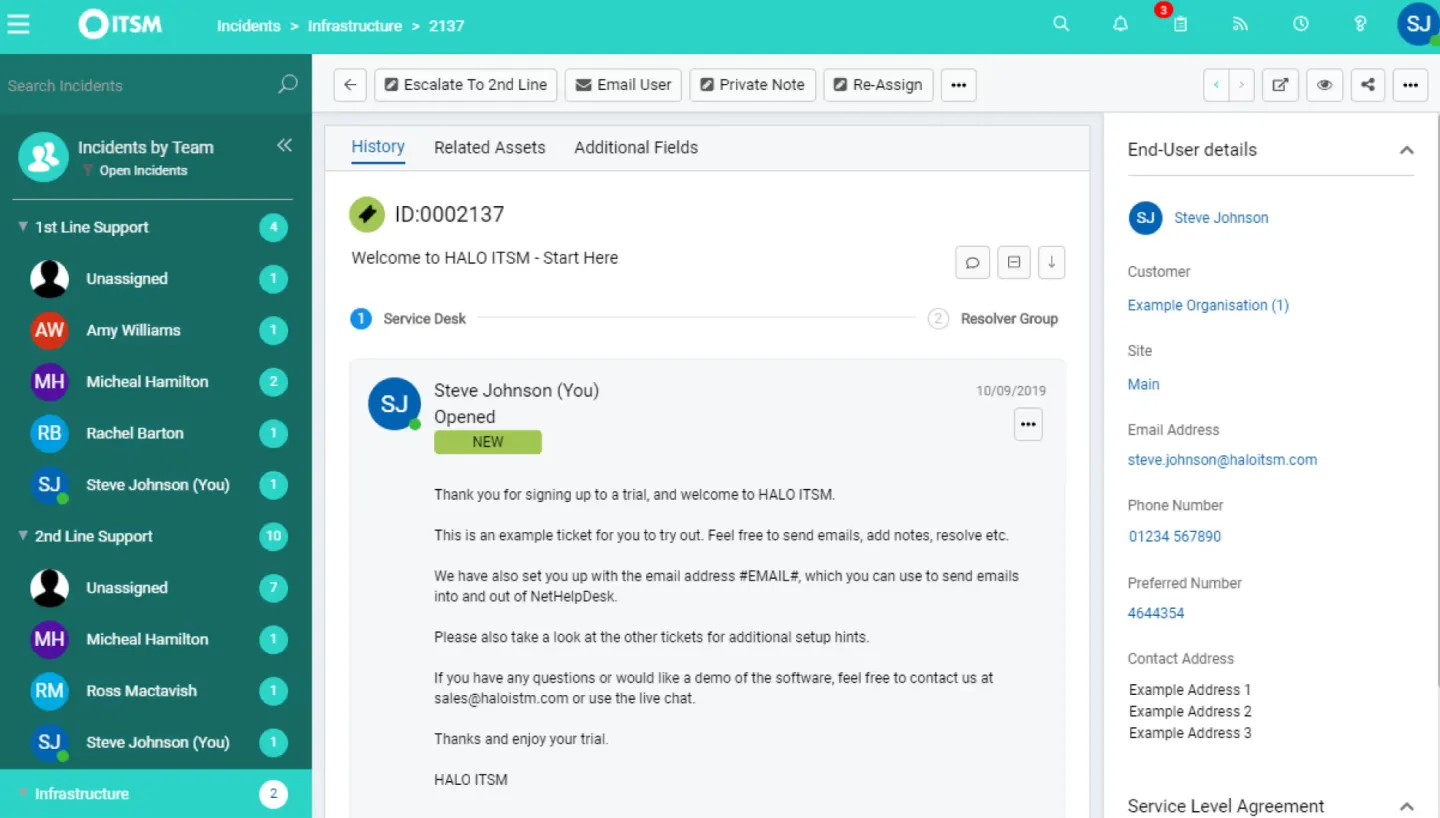
Overview
What is HaloITSM? HaloITSM is a powerful, all-in-one IT service management platform designed for enterprises that need flexibility, scalability, and ease of use without sacrificing the depth of ITIL-aligned processes or deployment options.
HaloITSM offers a feature-rich environment with automation, reporting, and multi-channel support, making it an excellent choice for organizations aiming to streamline their IT operations without sacrificing customization or dealing with cloud-only limitations.
Key Features of HaloITSM:
✔ Comprehensive ITIL-aligned service management: Supports incident, problem, change, release, and asset management processes.
✔ Customizable workflows: Tailor workflows to meet your organization’s specific needs without requiring deep technical expertise.
✔ Multi-channel support: Manage requests via email, phone, chat, and a self-service portal.
✔ Automation and scheduling: Automate routine tasks, ticket assignments, and notifications to improve efficiency.
Pros of HaloITSM:
✔ Easy to configure: Highly customizable workflows without the need for coding.
✔ Affordable enterprise solution: More cost-effective than other enterprise ITSM platforms.
✔ Scalable: Grows with your business, from small IT teams to large enterprise deployments.
✔ Cloud-based or on-premise: Flexible deployment options depending on your infrastructure.
Cons of HaloITSM:
❌ Limited AI features: Lacks advanced AI-driven automation found in other enterprise ITSM solutions.
❌ Fewer advanced analytics options: May require integration with external BI tools for deeper analysis.
HaloITSM Pricing:
💲 Custom pricing based on the size of the organization and feature requirements.
HaloITSM is Best For:
🏢 Enterprises and large organizations seeking a highly customizable, scalable, and affordable ITSM solution that aligns with ITIL best practices and offers flexible deployment options.
Looking to transform your ITSM?
5. Atomicwork: Best for AI-Powered ITSM
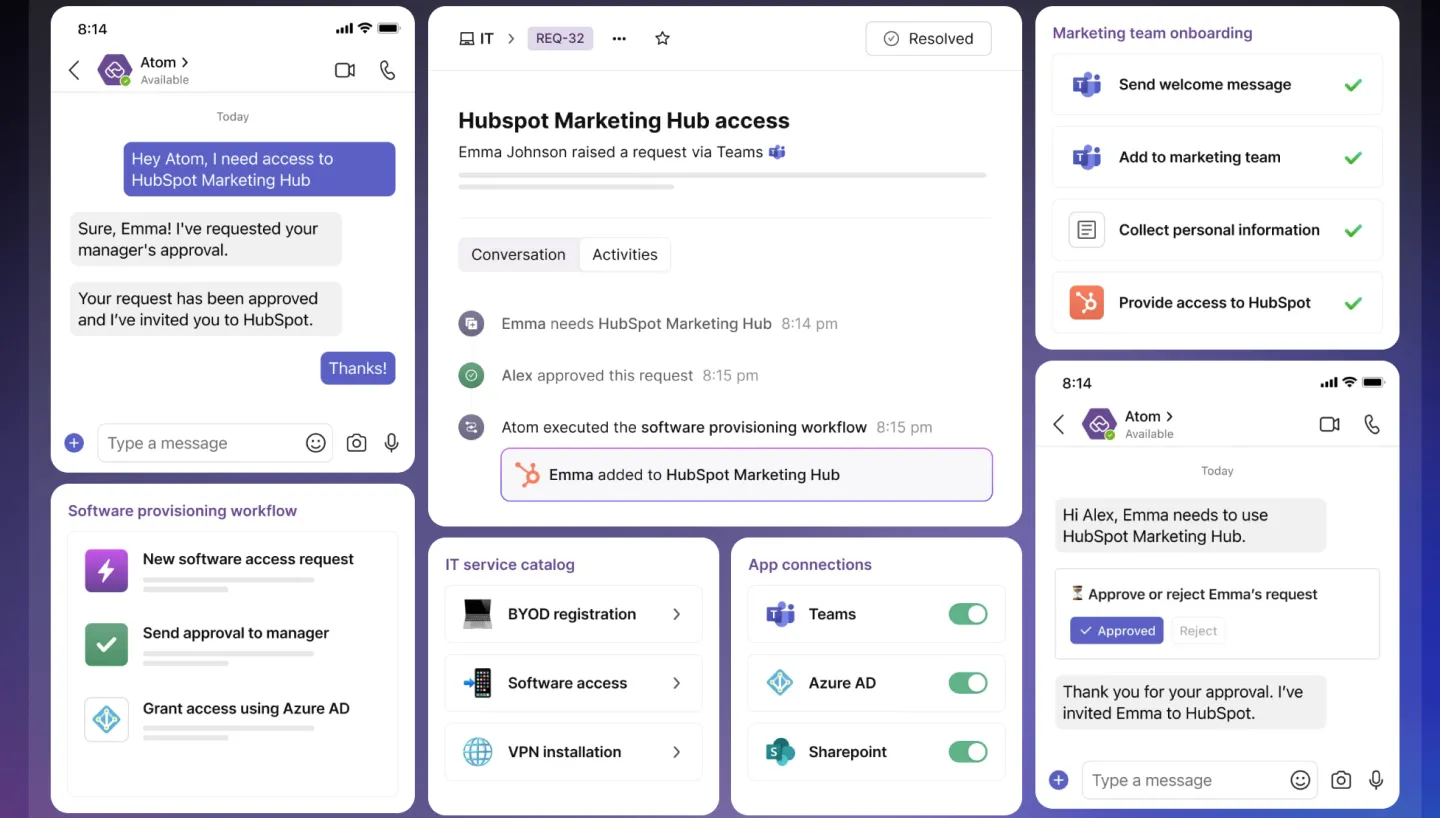
Overview
What is Atomicwork? Atomicwork is a next-generation IT service management platform that uses AI-native architecture to simplify IT operations through intelligent automation, predictive insights, and intuitive workflows. This enables organizations to streamline service requests without the complexity of traditional ITSM tools.
Atomicwork is designed to simplify IT operations through automation, AI-driven insights, and intuitive workflows. It enables organizations to streamline service requests, enhance productivity, and improve user experiences without dealing with legacy system complexity.
Key Features of Atomicwork:
✔ AI-Powered Assistance: Uses intelligent automation to classify, assign, and resolve service requests efficiently.
✔ Multi-Channel Support: Handles IT inquiries through email, chat, and enterprise collaboration tools.
✔ Seamless Connectivity: Integrates with leading business applications and communication platforms.
✔ Flexible Process Automation: Allows businesses to configure service workflows to match their operational needs.
✔ Performance Analytics & Monitoring: Tracks service efficiency and identifies areas for improvement.
Advantages of Atomicwork:
✔ Reduces manual effort: Intelligent automation optimizes service management.
✔ Adaptable and scalable: Supports business growth and evolving IT needs.
✔ Straightforward user interface: Designed for ease of use with minimal setup requirements.
Limitations of Atomicwork:
❌ Lacks full ITIL framework: May not meet the requirements of highly regulated industries.
❌ Limited enterprise-grade customizations: Less flexible for organizations with highly specific ITSM needs.
❌ Advanced configurations require technical input: Some automation setups may need developer involvement.
Atomicwork Pricing
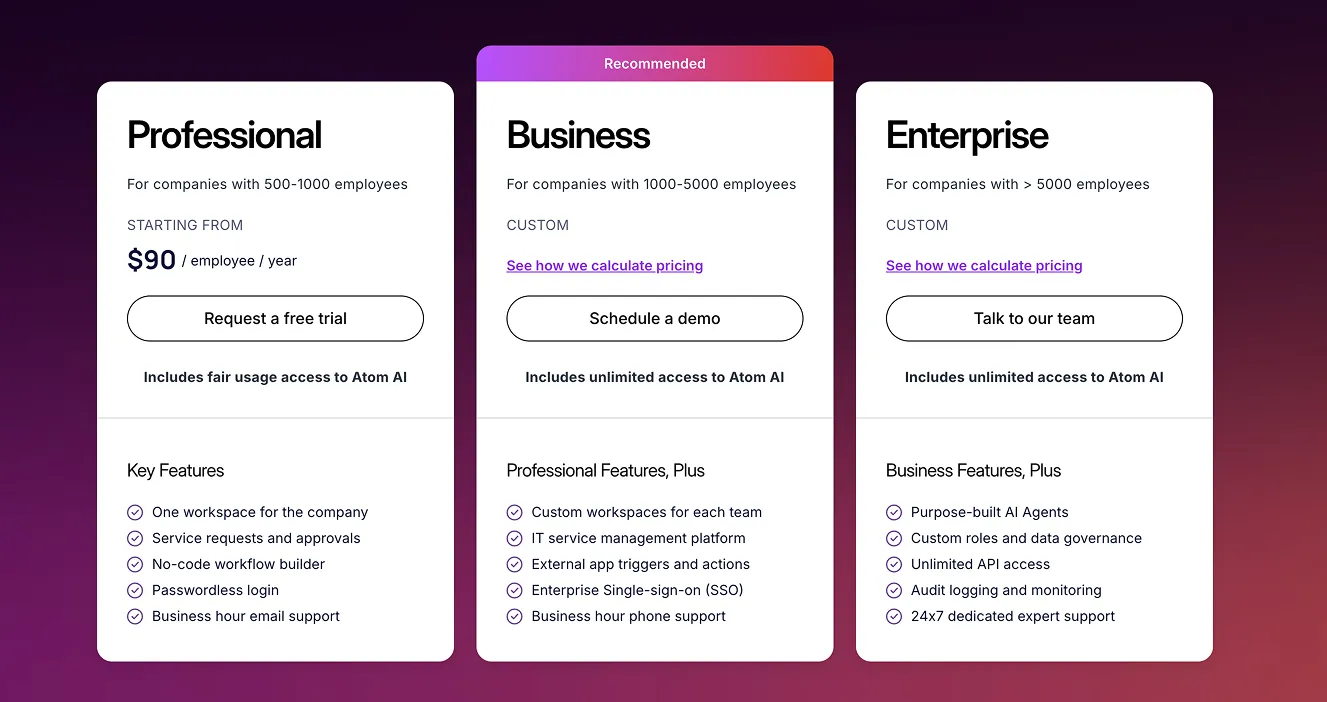
💲 Starts at $90 per user per year & custom pricing based on business size and service requirements.
Who Should Use AtomicWork?
🏢 Organizations looking for an AI-enhanced ITSM solution that is intuitive, automation-driven, and seamlessly connects with existing business tools.
Looking to transform your ITSM?
Which ServiceNow Alternative Is Right for You?
Choose based on your primary need:
DevOps integration: Jira Service Management
Fastest deployment: Freshservice
Enterprise automation: BMC Helix ITSM
Deployment flexibility: Halo ITSM
CX-first approach: Zendesk
AI-native architecture: Atomicwork
Best value for SMBs: Freshservice or Jira Service Management
Regulatory compliance: BMC Helix ITSM or Halo ITSM
Still unsure? Your decision typically comes down to three factors: existing tool ecosystem, team technical sophistication, and budget constraints.
ServiceNow vs. Its Top Competitors: Feature Comparison
.webp)
Cost Comparison: ServiceNow vs Leading Competitors
Switching from ServiceNow to a modern alternative typically delivers 40–60% cost savings over three years. Many CIOs come to us after surprise renewal quotes or hidden add-on fees. Here's what you can actually expect to pay:
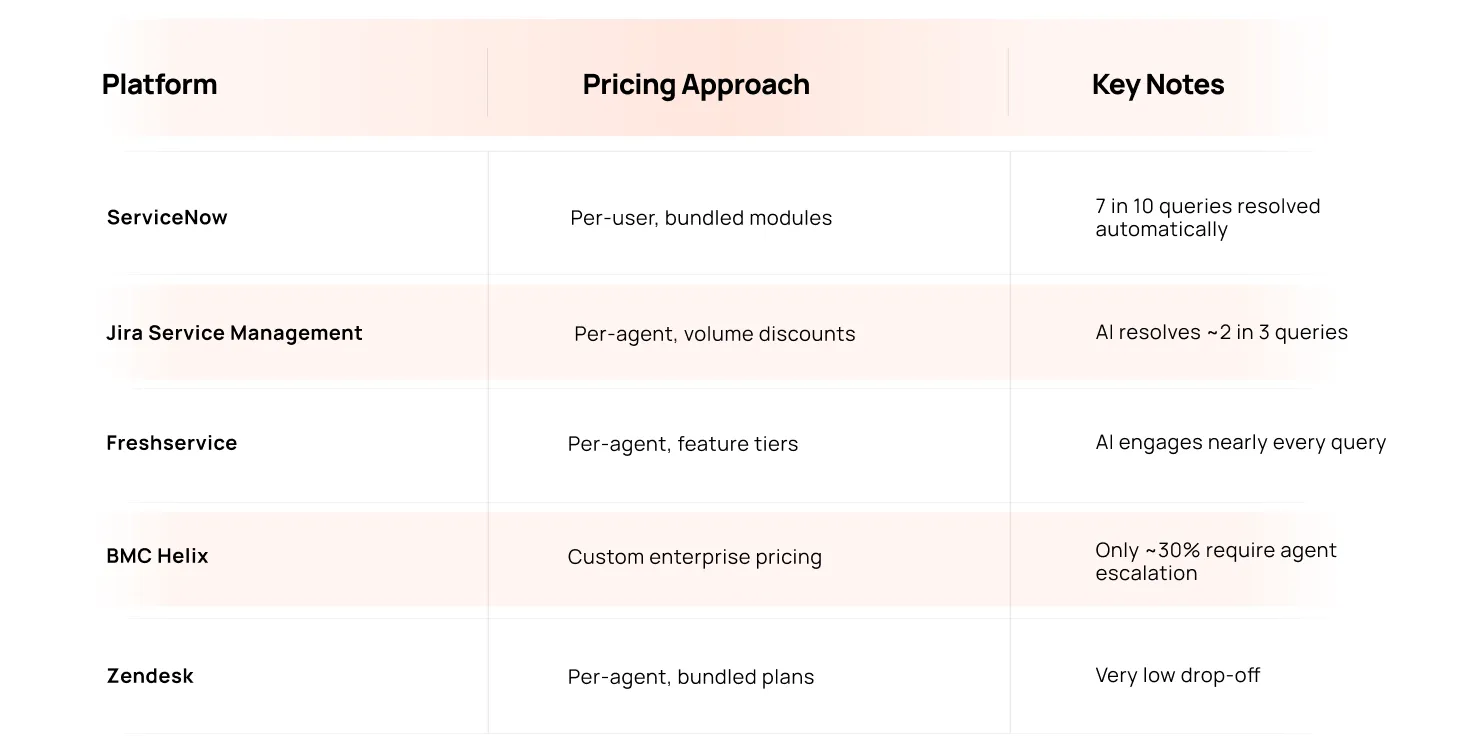
How Long Does ServiceNow Migration Take?
ServiceNow migration timelines vary dramatically from days to months or even years. It depends on complexity, customization depth, and organizational readiness. Simple data migrations to platforms like Freshservice can be completed in days or weeks with clean data, while enterprise-scale transformations involving extensive custom code, process redesign, or legacy system overhauls can stretch beyond a year.
Quick Migrations (Days to Weeks):
Minimal customization: Standard configurations with straightforward data mapping.
Small data volumes: Limited historical records and attachments.
Example: Freshservice migrations with background sync can complete in 1–2 weeks with proper data preparation.
Moderate Migrations (2–6 Months):
Significant customizations: Complex workflows, integrations, and modified processes requiring careful mapping.
Data cleansing requirements: Time invested in cleaning and validating legacy system data.
Example: Full ITSM transformations with process re-engineering typically require 3–6 months, according to practitioner communities.
Enterprise-Scale Migrations (6+ Months to Years):
Extensive custom code: Migrating complex scripts, workflows, and heavily modified instances.
Large data volumes: Massive historical datasets with intricate relationships.
Process overhaul: Redesigning core business processes (essentially a new implementation).
Example: Replacing heavily customized platforms like Cherwell or legacy systems can take 12+ months, per migration specialists at Aelum Consulting.
Key Factors That Determine Your Timeline:
Data quality: Poorly documented or messy data significantly extends timelines.
Customization level: More custom code equals a more complex migration effort.
Team expertise: Lack of internal SMEs (Subject Matter Experts) creates delays.
Migration scope: Data-only moves vs. full process transformation.
Tooling: Specialized migration frameworks like saasgenie accelerate timelines. Azentio completed their 500-user ServiceNow to Jira Service Management migration in 8 weeks with zero data loss and full audit trail preservation
Bottom line: A migration can be as fast as a weekend data sync or as complex as a multi-year enterprise transformation. Success depends on upfront planning, data readiness, and choosing the right migration partner.
.webp)

